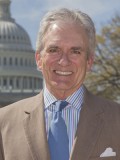
 By Executive Director J. Brent Walker
By Executive Director J. Brent Walker
James Dunn used to say, from time to time, “No one is ‘free as a bird.’ Only a bird is as free as a bird.”
As important as freedom is to what it means to be a Baptist and to the mission of the Baptist Joint Committee, freedom is not and cannot be absolute. It must be tempered by and held in tension with responsibility — duties we owe to each other, to the church, and even to government. This idea of responsible freedom finds expression theologically. The apostle Paul admonishes the church in Galatia not to use their freedom as an opportunity for self-indulgence, but to serve one another in love. He told the Galatians and tells us today the whole law can be summed up in one commandment, “you shall love your neighbor as yourself” (Galatians 5:13-14).
This truth also has implications ecclesiologically. Yes, we all come to God one at a time, personally and willingly. But our relationship with God must always be nurtured in the context of the community — with the admonishment of the family and the worshipping congregation. As Baptist journalist Bill Moyers has aptly reminded us:
“[Our Baptist] beliefs do not make for lawless anarchy or the religion of Lone Rangers. … They aim for a community with moral integrity, the wholeness that flows from mutual obligation. Our religion is an adventure in freedom within boundaries of accountability.”
This truth unfolds politically. It recognizes our responsibilities to government. Jesus clearly outlined our duties to both God and government when he said to render unto the emperor things that are the emperor’s and to God the things that are God’s (Matthew 22:21). And Paul acknowledges the legitimacy of government rule as a divinely ordained enterprise (Romans 13:1). Unlike some of our Anabaptist cousins, we Baptists have always been willing to engage culture and participate in the political process. From Thomas Helwys to Roger Williams to John Leland to Isaac Backus to Jimmy Carter, Baptists have been involved in politics — acting sometimes as prophets, sometimes as priests, sometimes as participants.
The notion of limited freedom is grounded constitutionally. Even the First Amendment — the pinnacle of our commitment to individual liberties — is not absolute and often requires a balancing of interests. We do not have the free speech right to shout “fire” in the proverbial crowded theater. Our freedom of the press does not mean one can publish malicious lies in newspapers — even about public figures — without risking a libel suit. Our First Amendment right to assemble and to petition the government for redress of grievances must be peaceable and is subject to reasonable time, place and manner restrictions by government.
The First Amendment’s religion clauses are not susceptible to black and white treatment either. The Establishment Clause does not ban all government-sponsored encouragement of religion. It only requires that governmental acts have at least one secular purpose and the primary effect does not advance religion. The institutions of government and religion can cooperate in many ways, as long as it does not result in excessive entanglement between church and state. Balancing of interests and line-drawing are part of the Establishment Clause’s calculus.
The same goes for the Free Exercise Clause. You can believe what you want and worship as you please, but you cannot exercise your religion in a way that unduly harms other people or seriously compromises the public interest. Insistence upon unfettered religious freedom, no matter what the impact on others or the sufficiency of governmental accommodation, is not only untenable but may engender a backlash that actually impedes religious freedom. (This is one of the main points of the BJC’s Zubik brief.) In short, the wall of separation between church and state is not impenetrable. Sometimes it looks more like a chain link fence.
The point cannot be over-emphasized: we must not exercise our freedom selfishly, but in a way that serves God, respects the well-being of others, honors the government and promotes the common good.
Come to think of it, James Dunn might not have been completely right. Maybe not even birds are as free as birds — the freedom to not flap their wings in flight will allow them to glide only so far before plummeting to earth.
From the May 2016 edition of Report from the Capital. Click here to view the issue as a PDF document.




